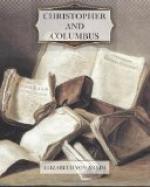“Those Sacks—” began Anna-Rose; and then she finished irrelevantly by remarking that it was the details of life that were discouraging,—from which Anna Felicitas knew that Christopher’s heart was once more in her boots.
“Come along,” said Mr. Twist, urging them to wards the gangway. “Anything you’ve got to say about life I shall be glad to hear, but at some time when we’re more at leisure.”
It had never occurred to either of the twins that the Clouston Sacks would not meet them. They had taken it for granted from the beginning that some form of Sack, either male or female, or at least their plenipotentiary, would be on the wharf to take them away to the Sack lair, as Anna-Felicitas alluded to the family mansion. It was, they knew, in Boston, but Boston conveyed nothing to them. Only Mr. Twist knew how far away it was. He had always supposed the Sacks would meet their young charges, stay that night in New York, and continue on to Boston next day. The twins were so certain they would be met that Mr. Twist was certain too. He had concluded, with a growingly empty feeling in his heart as the time of separation drew near, that all that now remained for him to do on behalf of the Twinklers was to hand them over to the Sacks. And then leave them. And then go home to that mother he loved but had for some time known he didn’t like,—go home a bereft and lonely man.
But out of the crowd on the pier, any of whom might have been Sacks for all the Twinklers, eagerly scanning faces, knew, nobody in fact seemed to be Sacks. At least, nobody came forward and said, “Are you the Twinklers?” Other people fell into each other’s arms; the air was full of the noise of kissing, the loud legitimate kissing of relations; but nobody took any notice of the twins. For a long while they stood waiting. Their luggage was examined, and Mr. Twist’s luggage—only his was baggage—was examined, and the kissing and exclaiming crowd swayed hither and thither, and broke up into groups, and was shot through by interviewers, and got packed off into taxis, and grew thinner and thinner, and at last was so thin that the concealment of the Sacks in it was no longer possible.
There were no Sacks.
To the last few groups of people left in the great glass-roofed hall piled with bags of wool and sulphur, Mr. Twist went up boldly and asked if they were intending to meet some young ladies called Twinkler. His tone, owing to perturbation, was rather more than one of inquiry, it almost sounded menacing; and the answers he got were cold. He wandered about uncertainly from group to group, his soft felt hat on the back of his head and his brow getting more and more puckered; and Anna-Rose, anxiously looking on from afar, became impatient at last of these refusals of everybody to be Sacks, and thought that perhaps Mr. Twist wasn’t making himself clear.
Impetuous by nature and little given to calm waiting, she approached a group on her own account and asked them, enunciating her words very clearly, whether they were by any chance Mr. and Mrs. Clouston Sack.




